|
|
|
ADVERTISEMENTS
|
|
PREMIUM
- HAPPY HOLIDAYS!
- Siliconeer Mobile App - Download Now
- Siliconeer - Multimedia Magazine - email-Subscription
- Avex Funding: Home Loans
- Comcast Xfinity Triple Play Voice - Internet - TV
- AKSHAY PATRA - Bay Area Event - Sat. Dec 6
- Calcoast Mortgage - Home Loans
- New Homes in Silicon Valley: City Ventures - Loden Place - Morgan Hill
- Bombay to Goa Restaurant, Sunnyvale
- Buying, Sellling Real Estate in Fremont, SF Bay Area, CA - Happy Living 4U - Realtor Ashok K. Gupta & Vijay Shah
- Sunnyvale Hindu Temple: December Events
- ARYA Global Cuisine, Cupertino - New Year's Eve Party - Belly Dancing and more
- Bhindi Jewellers - ROLEX
- Dadi Pariwar USA Foundation - Chappan Bhog - Sunnyvale Temple - Nov 16, 2014 - 1 PM
- India Chaat Cuisine, Sunnyvale
- Matrix Insurance Agency: Obamacare - New Healthcare Insurance Policies, Visitors Insurance and more
- New India Bazar: Groceries: Special Sale
- The Chugh Firm - Attorneys and CPAs
- California Temple Schedules
- Christ Church of India - Mela - Bharath to the Bay
- Taste of India - Fremont
- MILAN Indian Cuisine & Milan Sweet Center, Milpitas
- Shiva's Restaurant, Mountain View
- Indian Holiday Options: Vacation in India
- Sakoon Restaurant, Mountain View
- Bombay Garden Restaurants, SF Bay Area
- Law Offices of Mahesh Bajoria - Labor Law
- Sri Venkatesh Bhavan - Pleasanton - South Indian Food
- Alam Accountancy Corporation - Business & Tax Services
- Chaat Paradise, Mountain View & Fremont
- Chaat House, Fremont & Sunnyvale
- Balaji Temple - December Events
- God's Love
- Kids Castle, Newark Fremont: NEW COUPONS
- Pani Puri Company, Santa Clara
- Pandit Parashar (Astrologer)
- Acharya Krishna Kumar Pandey
- Astrologer Mahendra Swamy
- Raj Palace, San Jose: Six Dollars - 10 Samosas
CLASSIFIEDS
MULTIMEDIA VIDEO
|
|
|
|
|
NEWS DIARY
Frogs ‘Marry’ to Bring Rain to Bangladesh | Suicide Attack Kills 48 at Pakistani Mosque | Kashmiris Mourn | Kumari Row | Tamil Plight | Arms Probe | Heavy Toll | Role Reversal
Frogs ‘Marry’ to Bring Rain to Bangladesh
 More than 250 people in northern Bangladesh have attended a wedding ceremony between two frogs. More than 250 people in northern Bangladesh have attended a wedding ceremony between two frogs.
More than 250 people in northern Bangladesh have attended a wedding ceremony between two frogs as part of a ritual to bring rain to the parched region, a newspaper said March 27.
The “bride” and “groom” came from two neighboring villages 68 miles north of the capital Dhaka, according to the Bengali paper Jugantor.
Villagers organized the wedding ceremony because the region was suffering a water shortage as it waited for monsoon rains to arrive, according to school teacher Noor Mohammad Kalon, who was a guest on behalf of the “groom.”
“More than 250 men, women and children came to the wedding. We all danced and sang,” the teacher, 42, told AFP by telephone, adding that the guests were served a traditional wedding feast of rice, lentils, fish, beef and sweets.
“The bride and groom were in special wedding dress. We blessed them in the ceremony and released them in a nearby pond afterwards.
“Last night there was rain. I believe it was because of the wedding.”
|TOP|
Suicide Attack Kills 48 at Pakistani Mosque
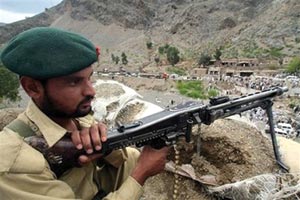 A Pakistani Army soldier secures the area near a destroyed mosque after a blast in Jamrud, in the Khyber region, about 16 miles from the Afghan border. A Pakistani Army soldier secures the area near a destroyed mosque after a blast in Jamrud, in the Khyber region, about 16 miles from the Afghan border.
A suicide bomber demolished a mosque March 27 in Peshawar packed with hundreds of worshippers attending Friday prayers near the Afghan border, killing at least 48 people and injuring scores more, in the bloodiest attack in Pakistan this year. The bomber struck at the climax of the service, as the mosque leader was starting the communal prayer, witnesses said.
“As the prayer leader said ‘God is Great,’ the bomb went off with a big bang,” said Nadir Shah, a local paramilitary solider attending the mosque. “I felt it was the end of everything. Sometime later when I opened my eyes, I was lying among dead bodies.”
The blast in the fabled Khyber Pass came hours before President Barack Obama unveiled a revised strategy to “disrupt, defeat and dismantle” the al-Qaida terrorist organization and the Taliban operating in Afghanistan and Pakistan’s northwest.
A government official accused Islamist militants of carrying out the bombing in revenge for a recent offensive aimed in part at protecting the major supply route for NATO and U.S. troops in Afghanistan that passes in front of the mosque. Several of the dead were local security officers who were praying there, officials said.
“Residents of this area had cooperated and helped us a lot. These infidels had warned that they will take revenge,” said Tariq Hayat, the top administrator of the Khyber tribal region. “They are the enemy of Pakistan. They are the enemy of Islam.”
Rising violence in Pakistan is fueling doubts about the pro-Western government’s ability to counter Taliban and al-Qaida militants also blamed for attacks on Western troops in Afghanistan.
|TOP|
Kashmiris Mourn
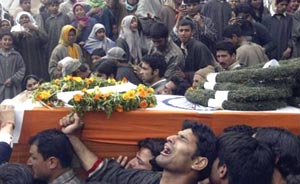 Unusual public outpouring of grief in Kashmir. Unusual public outpouring of grief in Kashmir.
The funeral north of Srinagar in Indian-administered Kashmir was just like those of countless others who have died violently over the past 20 years.
A Muslim killed in the insurgency was laid to rest in his ancestral graveyard in the village of Dub, north of Srinagar, surrounded by thousands of mourners.
What made the ceremony unusual was that this was no militant who had died fighting the Indian army.
This was a Kashmiri who served with the Indian army and died fighting the militants.
Shabir Ahmed Malik was among eight Indian soldiers killed in a gun battle earlier this week with separatist militants in Kupwara.
Over the past two decades, hundreds of Kashmiris have died while fighting for India.
Malik was a dedicated soldier of the Indian army.
Among them are police officials and Ikhwanis, or “renegade” militants who have been persuaded or coerced — depending on who you believe — to abandon militancy and instead work for the Indian security forces. Most Ikhwanis were or are pariahs.
But Shabir, 21, joined the Indian army after passing his 12th class examination. He studied at the Sainik (army) School at Ganderbal.
Shabir’s family and neighbors are proud of his army service.
“He has become a hero. He died an honorable death. I am so happy, although I am also pained at his separation,” says Mohammad Yasin, a neighbor and friend of the dead man.
The coffin was draped in India’s tricolor before it was carried to the graveyard.
Shabir’s brother, Ghulam Mohammad, says: “He had a passion for joining the army and was determined to complete his graduation so he could become an army officer.
“He was patriotic from his childhood. He wanted to do something for his country. His ambition has been fulfilled.”
|TOP|
Kumari Row
 Mateena Shakya Mateena Shakya
After a raging controversy over the appointment of priests at the revered Hindu shrine of Pashupatinath in Kathmandu, now it is the turn of Kumari, Nepal’s famed “living goddess,” to be at the centre of a fresh row.
For the first time in Nepal’s history, the young girl worshipped as a “living goddess” by Hindus and Buddhists alike and a major attraction for foreign tourists, has discontinued her much-awaited daily appearances at the ornate wooden window of her palace for the people to worship and cheer.
Also for the first time, tourists have been stopped from entering her antique palace at the heart of the city.
“We took the decision to protest against the government apathy to Nepal’s priceless legacy,” said Gautam Shakya, a member of the local vigilante committee that is up in arms against the municipal authorities.
“Since Monday, we are not allowing tourists to enter the Kumari’s palace; nor will she appear for public at the window of the palace till the government takes action.”
The anger was ignited after thieves tried to steal a decorative wooden panel from the temple at the dead of night but were foiled after the army post nearby raised an alarm.
The Palace Area Conservation Pressure Group formed by the local residents says the attacks on the Kumari temple have increased since last year.
The Kumari palace is in Basantapur, a square that also houses the old palace of the deposed Shah kings of Nepal. It was built in 1757 by the last king of the Malla dynasty, Jayaprakash Malla, and renovated only once in 1966.
Decorated with intricately carved wooden doors and windows, the Kumari temple is an architectural heirloom of Nepal that, like many old temples, is now the target of antique thieves.
|TOP|
Tamil Plight
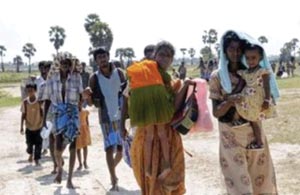 Sri Lankan Tamil civilians arrive to a government-controlled area after fleeing territory controlled by Tamil Tigers. Sri Lankan Tamil civilians arrive to a government-controlled area after fleeing territory controlled by Tamil Tigers.
More than 2,100 civilians fled in one day from Sri Lanka’s northern war zone where the military is squeezing the Tamil Tiger rebels into a smaller area as it pushes to end 25 years of civil war, the military said March 27.
The displaced, including 900 children, crossed over the previous day to military-controlled areas in Puthkkudiyirippu, near the edge of the front lines in the northeast of the island, said military spokesman Brig. Udaya Nanayakkara.
It was the largest number of civilians to flee in a single day in several weeks, Nanayakkara said.
An average of 1,000 civilians a day have fled the area in recent weeks, highlighting the danger they face as the military has driven the rebels into just 8.4 square miles of jungle and beach on the northeastern coast.
In a statement posted on its Web site, the military said it killed 29 rebels. It said 13 were killed in a battle near Puthkkudiyirippu, while army snipers killed another 16. It did not say when the clashes took place.
The area on the coast includes a so-called “no-fire” zone, but the United Nations and aid groups have accused the rebels of firing from the zone and of forcing tens of thousands of terrified civilians to go with them, sometimes using them as human shields.
Government troops have been accused of shelling the zone. The government denies the charges. The area is off limits to the media, and the rebels, formally known as the Liberation Tigers of Tamil Eelam, could not be reached for comment because communication with its stronghold has been cut.
The UN estimates 150,000 to 190,000 civilians are trapped by the fighting and cannot escape, resulting in dozens of deaths each day.
|TOP|
Arms Probe
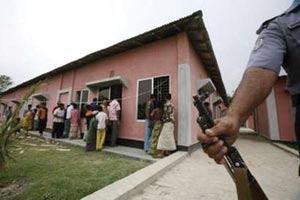 Police guard the Green Crescent Madrasa in Bhola, Bangladesh. Police guard the Green Crescent Madrasa in Bhola, Bangladesh.
Bangladeshi police investigating a huge arms haul in the south of the country are investigating the possible role of the head of a British charity, the BBC reports.
The whereabouts of Dr Faisal Mostafa are unknown, although some unconfirmed reports say that he is in police custody in Bangladesh.
The weapons cache was found at a madrassa, allegedly run by a charity based in Manchester.
The UK’s Charity Commission is investigating the allegations.
Newspaper reports in Britain say that Dr Mostafa - the head of the Green Crescent charity which runs the madrassa - had previously been tried for plotting explosions in the UK.
He was cleared in 2002 of planning to cause terrorist acts by using high explosives.
In November 2008 Dr Mostafa was found guilty by a court in Manchester of possession of dangerous weapons and making a false statement about baggage cargo at the city’s airport.
Bangladeshi police say that the arms haul - which included weapons, bomb-making equipment, bullets and booklets about jihad - was found in the coastal district of Bhola, about 60 miles south of Dhaka.
No-one at the charity, based near Manchester in north-west England, has so far commented on the allegations.
The UK Charity Commission has said it wanted to find out “whether or not the charity, its funds, or funds raised on its behalf were used unlawfully”.
The commission’s Web site said that in 2008, Green Crescent had a turnover approaching $102,733.
British newspapers say that Dr Mostafa is a chemistry graduate. He is listed as a trustee for the charity on the commission’s website.
|TOP|
Heavy Toll
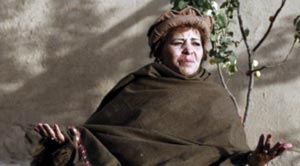 Parwin Mushthal Parwin Mushthal
Afghan actress Parwin Mushthal’s passion for her job has exacted a heavy toll — resulting in the murder of her husband and forcing her to live in hiding with her two children, reports the BBC.
Mushthal’s career choice appears to have upset the Taleban and their supporters.
She has received threatening telephone calls and abuse in the streets from people telling her to stop acting.
She told the BBC that she believes her continued defiance of those threats resulted in the shooting by unknown gunmen of her 39-year-old husband, a taxi driver, in Kabul in December.
Since then her life has been turned upside down.
Parwin Mushthal’s interest in acting stemmed from her days at high school. She has appeared in more than 20 theatre productions and dozens of films and is a regular on Afghan television.
The re-emergence of the Taleban has profoundly affected the lives of women.
She is currently in the television series, Bulbul, and has appeared in numerous adverts.
Her best known performances are in Shakespeare’s Love’s Labor’s Lost, which was performed in the Dari language, and in Soeurs (which she co-created). Both productions were in collaboration with Kabul’s Foundation for Culture and Civil Society.
But although Mushthal was well known, she had to hide her career from her husband’s family, because many people in Afghanistan link acting with immorality. Women who act can find themselves accused of prostitution.
|TOP|
Role Reversal
IBM announced a major round of U.S. layoffs recently, even as the company has been hiring workers in developing nations like India.
But over the past year, the company began offering U.S. workers who are facing a job cut a novel carrot: If you apply for a new IBM position in a foreign country and are hired again at local wages, we will cover some of the transition costs like visa fees.
Few IBMers have taken the offer, and the firm has taken public relations lumps over it. But a handful of pioneering Americans at other firms have started to shop their skills on the Indian market, finding fulfillment and job security at a time of deep recession back home.
The IBM offer hints at a future where it’s not just skilled Indians who might have to travel halfway around the globe for a job. It’s likely that more American job seekers will have to think globally, say analysts, and the experiences of Americans who have taken jobs with companies here say it’s not something to fear.
“I was making six figures when I left the States. I’m making six figures here — in rupees,” laughs Jeanne Heydecker, a marketing executive now living outside of Delhi and working at her third Indian company. Actually, it’s more like seven figures, since the salary for this single mother translates to roughly $50,000 a year. But it would be a mistake to suppose her quality of life has gone down.
Most everything she could want is available in Delhi. The healthcare, she says, has been top-notch and bottom-dollar. And like most Westerners and wealthy Indians here, she is able to hire people to cook, clean, and drive for her.
“You can come home from work and focus on your family, not on maintaining the car and the housework,” she says.
|TOP|
|
|
|
|
|
|